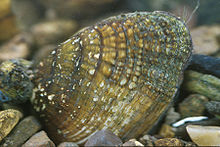Birdwing pearlymussel
| Birdwing pearlymussel | |
|---|---|

| |
| Scientific classification | |
| Domain: | Eukaryota |
| Kingdom: | Animalia |
| Phylum: | Mollusca |
| Class: | Bivalvia |
| Order: | Unionida |
| Family: | Unionidae |
| Tribe: | Lampsilini |
| Genus: | Lemiox Rafinesque, 1831 |
| Species: | L. rimosus
|
| Binomial name | |
| Lemiox rimosus (Rafinesque, 1831)
| |
| Synonyms[3] | |
| |
The birdwing pearlymussel (Lemiox rimosus) is a rare species of freshwater mussel in the family Unionidae, the river mussels. This aquatic bivalve is native to Tennessee and Virginia in the United States. Its range has declined over 90%.[4] It is a federally listed endangered species of the United States.[5][6]
This mussel remains in three rivers in Tennessee and Virginia, the Duck, Clinch, and Powell Rivers, having been extirpated from many more. It is now extinct in the state of Alabama.[4]
Failed efforts to transplant the birdwing pearly mussel and the Cumberland monkeyface pearly mussel (Theliderma intermedia), also endangered, to local streams brought an end to construction on the half-completed and long-contested Columbia Dam on the Duck River in 1983.[7]
The greenside darter (Etheostoma blennioides) is an important host species for the birdwing pearly mussel's glochidia larvae. The mussel attracts the darter with a lure that looks like an aquatic snail. The glochidia release triggered by the darter's interaction with the lure directs the glochidia to attachment sites on the fish's gills. After a variable amount of time, often as long as one-and-a-half to two months,[8] the glochidia metamorphose into mussels and drop off the fish onto substrate. Glochidia survival to metamorphosis is optimal at relatively colder water temperatures than those preferred by other unionid species and their hosts.[8]
References
[edit]- ^ Cummings, K.; Cordeiro, J. (2012). "Lemiox rimosus". IUCN Red List of Threatened Species. 2012: e.T11479A502943. doi:10.2305/IUCN.UK.2012.RLTS.T11479A502943.en. Retrieved 16 November 2021.
- ^ "Appendices | CITES". cites.org. Retrieved 2022-01-14.
- ^ "Lemiox rimosus (Rafinesque, 1831)". Global Biodiversity Information Facility. Retrieved 10 March 2023.
- ^ a b NatureServe (3 March 2023). "Lemiox rimosus". NatureServe Network Biodiversity Location Data accessed through NatureServe Explorer. Arlington, Virginia: NatureServe. Retrieved 10 March 2023.
- ^ "Birdwing pearlymussel (Lemiox rimosus)". Environmental Conservation Online System. U.S. Fish & Wildlife Service. Retrieved 10 March 2023.
- ^ 41 FR 24062
- ^ Aldrich, Marta (10 October 1999). "$83 Million Later, Unfinished Dam Being Dismantled". Seattle Times. Columbia, TN. Retrieved 13 September 2016.
- ^ a b Kirk, Molly (29 June 2023). "Saving the Birdwing Pearlymussel to Keep Virginia's Waters Clean". Notes from the Field. Photographs by Tim Lane. Virginia Department of Wildlife Resources. Retrieved 1 July 2023.

